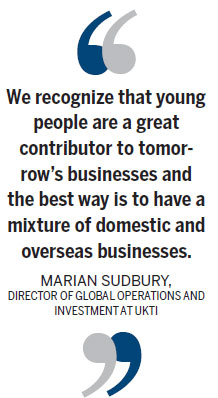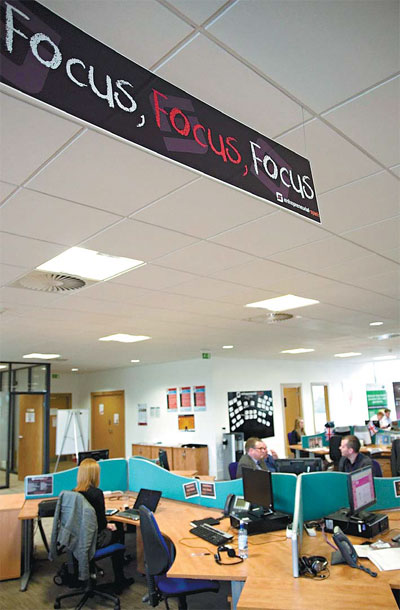Young Chinese talent put in incubator
Updated: 2015-01-30 08:42
By Cecily Liu(China Daily Europe)
|
|||||||||||
Government and private programs are helping young Chinese entrepreneurs establish reputable startups
China's rapidly growing economy has given rise to a large contingent of young talent keen on becoming entrepreneurs, many of whom have found a market or the right support to realize their dreams in the United Kingdom.
Many of these young Chinese have blazed their own path in the UK not only because of the country's open business environment and entrepreneurial spirit, but also through the support of a number of government-led and private-sector programs.
|
From left: Lin Zhenyu, founder of Sensory Media; Tara Shen, founder of an eyewear accessories company in Britain; Lesley Zhang, founder of Rentez-Vous, a clothes-sharing platform. |
|
Entrepreneurial Spark, a start-up accelerator in Glasgow. Photos provided to China Daily |
The Sirius program is one example of the UK's helping hand. Initiated by UK Trade & Investment, a government agency that works with businesses based in the country to help them expand to international markets, it gives young entrepreneurs a wide range of support, including mentoring, office space provisions and access to networking opportunities as well as working visas in the UK.
Marian Sudbury, director of global operations and investment at UKTI, says the Sirius program was launched to encourage overseas graduates to continue to contribute to the UK's creative and business environments after graduation.
"It's mainly targeted at overseas graduates. We recognize that young people are a great contributor to tomorrow's businesses, and the best way is to have a mixture of domestic and overseas businesses," Sudbury says.
She says the UK has an entrepreneurial culture because of its diverse ethnic population. In addition, the government has various incentives to encourage entrepreneurship, such as tax breaks for angel investors.
According to research published by the Centre for Entrepreneurs in March 2014, about 500,000 people from 150 countries had launched businesses in the UK, generating 14 percent of total jobs in the nation.
The Sirius program also helps the UK retain talented students after they graduate from its universities, Sudbury says.
"We do know there are a lot of foreign entrepreneurs coming to the UK. We are targeting those with specific talents and skills, who can create idea-driven enterprises in the UK."
The program, which began in 2012, was created after the aggregation of advice from various government representatives, academics, entrepreneurs and schools to make sure the program was efficient and would give participants the support they need.
Sudbury says Chinese students on the Sirius program are intelligent, well-educated, diligent and adaptable to working with people from different countries, though she adds that challenges include the ability to work together as a team.
"They are model participants in our program."

Lin Zhenyu, 24, is one of many Chinese participants in the Sirius program. He leads a team of five in a startup called Sensory Media, which helps restaurants automatically match their music to the lighting in a room using an LED lighting and application system.
Lin, who came to the UK to attain his master's degree in computer science at University College London in 2013, started working on the idea during his studies and later established Sensory Media with four students.
Two central London restaurants have since bought Sensory Media's product and Lin says his team is in the process of registering the technology's copyrights, after which they will focus on broadening the product's sales channels to more restaurants and bars.
Sensory Media, Lin says, will develop smaller scale products such as a single light bulb that will apply the same technology to homes.
Lin, who hails from Zhejiang province, says the entrepreneurial spirit of the region's people instilled in him the desire to start his own business as a child.
"I've always thought this is what I should do after graduating. It just came naturally."
Sensory Media was borne out of two failed attempts to establish two businesses - one focusing on LED technology and the other on web applications - during his undergraduate studies at Zhejiang University as well as from his love of music. Lin plays a number of instruments well.
In his current role as an entrepreneur, Lin says he is constantly learning new things and adapting to changes every day. In addition to managing the team, developing new technologies, Lin is also in charge of sales and marketing.
"We hope to develop the best technology in this sector and constantly make improvements to it through customer feedback, so that we will maintain our competitiveness in this industry," Lin says.
Another young Chinese entrepreneur is Lesley Zhang, 32, from Shanxi province.
In September 2013, she attended the Global Graduate Entrepreneurs' Festival in Manchester that was initiated by UK Trade and Investment. After meeting what would eventually turn out to be her business partner at the conference, the two worked to turn the concept of fashion rentals into an online venture. They created Rentez-Vous, a clothes-sharing platform for women who want to access high quality fashion without having to pay full prices.
"Basically, we allow women to rent clothes to one another and rent designer creations for a fraction of the price. Beyond peer-to-peer sharing, we are a unique marketing and customers acquisition tool for fashion designers and brands - by renting out their collections, they can get more awareness, more market surveys and sell more," Zhang says.
Currently the online platform has attracted early adopters, thanks to the support from the Sirius program. Owners of clothing and renters can contact each other directly via Rentez-Vous messaging system, which also facilitates payments, dry-cleaning, insurance policies and feedback.
"Rentez-Vous is a pioneer in this field. We spend time getting to understand our customers' needs and collecting their feedback. By gaining their loyalty and recognition over time, we aim to contribute to the sharing economy," she says.
Another Chinese businesswoman with a fashion startup is Tara Shen, 30, from Shanghai. She and friend Efrat Rassin established an eyewear accessories company after Shen completed her master's degree in fashion retail at the London College of Fashion.
Rassin's family has years of experience in the eyewear industry, having established a chain of eyewear stores in Israel.
Their company, 22 Halo, is an eyewear accessories brand that offers products ranging from necklaces that attach to glasses to fashionable bags that have a compartment especially designed for glasses.
"We've realized that there is a big gap in the market for fashionable eyewear accessories. Although glasses are very common, and are becoming increasingly fashionable, eyewear accessories have not yet caught up with market demand," Shen says.
She says many eyewear retailers currently employ a hospital-like decor to both their stores and the retail experience, but she hopes the accessories her team brings to the market will change this perception.
Her team joined the Sirius program in December and is in the process of designing products. She says the next stage will be to begin prototyping, production and sales of products through both e-commerce channels and working with existing retailers.
Shen, who gained a bachelor's degree in media communications and technology from Donghua University in Shanghai, has worked in China's fashion industry for about seven years before her studies at the London College of Fashion.
But forming an idea into an actual enterprise was daunting, Shen says.
"As a startup, the most challenging thing is 'you don't know what you don't know'."
Other challenges included understanding the accounting and legal sides of running a business. Applying for additional funding to take the business to full-scale operations was also a challenge, she says.
"Another challenge I had to overcome was how to manage my time, as there are many things to learn and do each day," she says, adding that she now makes plans to complete tasks for each day, week and month.
UKTI gave Shen's business extensive help on many fronts, ranging from practical advice, to office space, and introducing her to specialists across a number of sectors who offered their advice.
Halo secured office space at Entrepreneurial Spark, a free business accelerator for early-stage and growing ventures in Glasgow. Entrepreneurial Spark is a community of startup companies that can share ideas and offer support to help every venture grow.
"It is a very supportive environment and we have learned a lot by being there," Shen says.
In the near future, Shen says she wants to focus extensively on creating innovative designs.
"We can of course patent our products, but the reality is that you cannot stop from being copied. But if we constantly come up with new designs and innovative products, we will still take the lead," she says.
Another business supported by the Sirius program is EduKit, established by Max Wang, 26, from Zhejiang province.
EduKit is an IT company that helps children search for their most suitable future after graduating from King's College London.
"I knew a lot about the IT industry, and I realized there is a market gap for professional service companies that help students match their skills and interests with the subjects they wish to take," says Wang.
The application, which uses big data technology to forecast a student's future path based on their current interests, has seven schools as clients, one of which has become EduKit's official partner and provides advice and guidance for the company's research and development, Wang says.
"In developing the application, we have sought professional advice from psychologists, teachers, pupils and professional education consultancies. We believe the finished product is very much unique and addresses a big demand gap in the market."
The software takes into account four factors: a student's personal interests, current academic standing, the student's family financial background and learning disabilities, if any.
On average, each school pays EduKit about 900 pounds ($1,300; 1,200 euros) to 1,000 pounds each month. Both students and teachers are able to access the application.
There are other programs in the UK helping young Chinese entrepreneurs, such as 88 Initiative, established by Richard Heygate and Rob Wylie, who were in Britain's venture capital industry.
The 88 Initiative helps young Chinese people invest in UK startups, which in turn offers shares to the young investors, management positions at the startups and the opportunity to participate in the young company's growth.
To reduce on the risks involved in investing in startups, the 88 Initiative selects companies with relatively stable growth and creates products or technologies that have at least gained a local market. All of the startups are deemed to be ready for global marketing and promotion.
Heygate says these firms will have a greater chance of succeeding if they establish connections in China, potentially commercialize their products in the country and target its large market.
"A lot of British companies have given up looking for investment from China because they can't find someone who would do the deal. The first step is to have some Chinese staff who can maintain relations with Chinese investors over the long term. Secondly, their presence adds a degree of security for Chinese investors," he says.
cecily.liu@chinadaily.com.cn
|
Sensory Media will develop smaller scale products such as a single light bulb that will apply the same technology to homes. Photos provided to China Daily |
( China Daily European Weekly 01/30/2015 page14)
Today's Top News
US taking 'fresh look' at weapons for Ukraine
New regional system set up
EU Parliament evacuated as police check suspicious car
Indian PM expected to visit President Xi's hometown
Dalai Lama-Obama meet risks Sino-US trust
Nearly 90% of cities in China don't meet air quality standard
Chinese money flows into UK
Chinese woman brain dead in cosmetic surgery in S. Korea
Hot Topics
Lunar probe , China growth forecasts, Emission rules get tougher, China seen through 'colored lens', International board,
Editor's Picks

|

|

|

|

|

|








